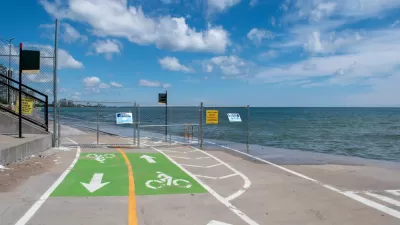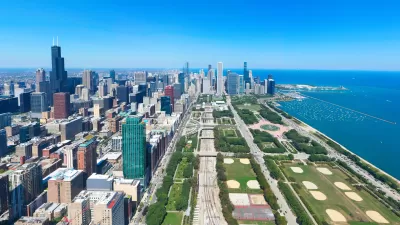Historically stable Lake Michigan has seen its water levels fluctuate dramatically over the last decade, posing increasingly urgent threats to lakeside property and causing severe droughts and flooding.

Although it "stands a half-continent away from the threat of surging ocean levels" and "hugs the shores of one of the grandest expanses of freshwater in the world," writes Dan Egan, Chicago is not immune from threats caused by climate change. Built on a swamp, the city faces the looming threat of rising water levels in Lake Michigan. High-rise buildings on the edge of Lake Superior, says Josh Ellis, former vice president of Chicago's Metropolitan Planning Council, are "just teetering on the edge of the lake" with "water lapping at their foundations."
"Lake Michigan’s water level has historically risen or fallen by just a matter of inches over the course of a year, swelling in summer following the spring snowmelt and falling off in winter. Bigger oscillations, a few feet up or down from the average, also took place in slow, almost rhythmic cycles unfolding over the course of decades." But "[i]n 2013, Lake Michigan plunged to a low not seen since record-keeping began in the mid-1800s, wreaking havoc across the Midwest." Then, "[j]ust a year later, in 2014, the lake started climbing at a stunning rate, ultimately setting a record summertime high in 2020 before drought took hold and water levels started plunging again."
This pattern is "threatening to upend centuries of relative stability along the Great Lakes’ 10,000 miles of shoreline, including the 22 miles that define Chicago’s eastern edge," writes Egan. "Beginning in fall 2019, a series of storms ravaged the neighborhoods that pocket Chicago’s mostly public shoreline. Nowhere has the lake been more menacing to lakefront property owners than the working-class neighborhood along South Shore Drive, about 10 miles south of downtown." As these extremes intensify, "the speed and uncertainty of the changes underscore how Chicago, in some crucial ways, is perhaps more immediately exposed to the dangers of global warming than cities on the ocean."
FULL STORY: The climate crisis haunts Chicago’s future. A Battle Between a Great City and a Great Lake

Trump Administration Could Effectively End Housing Voucher Program
Federal officials are eyeing major cuts to the Section 8 program that helps millions of low-income households pay rent.

Planetizen Federal Action Tracker
A weekly monitor of how Trump’s orders and actions are impacting planners and planning in America.

Ken Jennings Launches Transit Web Series
The Jeopardy champ wants you to ride public transit.

California Invests Additional $5M in Electric School Buses
The state wants to electrify all of its school bus fleets by 2035.

Austin Launches $2M Homelessness Prevention Fund
A new grant program from the city’s Homeless Strategy Office will fund rental assistance and supportive services.

Alabama School Forestry Initiative Brings Trees to Schoolyards
Trees can improve physical and mental health for students and commnity members.
Urban Design for Planners 1: Software Tools
This six-course series explores essential urban design concepts using open source software and equips planners with the tools they need to participate fully in the urban design process.
Planning for Universal Design
Learn the tools for implementing Universal Design in planning regulations.
Ada County Highway District
Clanton & Associates, Inc.
Jessamine County Fiscal Court
Institute for Housing and Urban Development Studies (IHS)
City of Grandview
Harvard GSD Executive Education
Toledo-Lucas County Plan Commissions
Salt Lake City
NYU Wagner Graduate School of Public Service





























